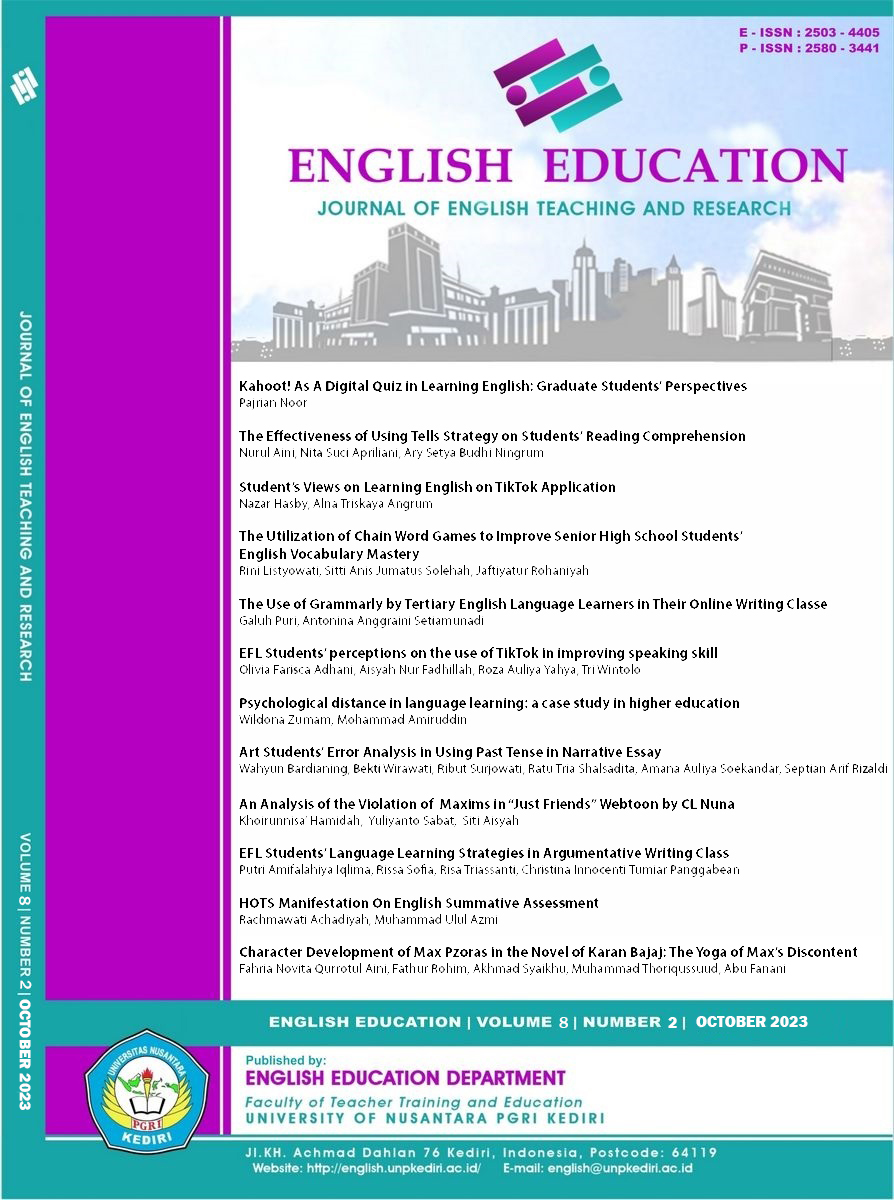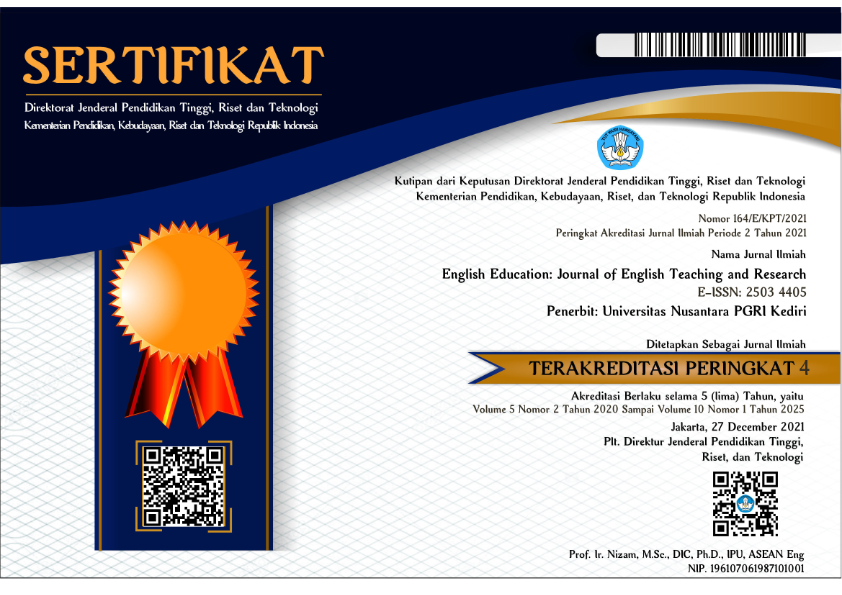Psychological distance in language learning: a case study in higher education
DOI:
https://doi.org/10.29407/jetar.v8i2.14338Keywords:
Key words: Psychological, Distance, Distan Learning, Higher EducationAbstract
The purpose of this study is to describe the psychological distance between students and teachers in higher education. This is a qualitative case study. This study includes students from Madura University's English Department. The purposive sampling approach is used to choose a sample. To collect data, major sources of information include observation and interviews, with documents acting as secondary sources. The study's findings show that the psychological distance between Students and lecturers improve students' learning processes and provide input for learning. These tactics are used by teachers to maintain a psychological distance from their students. According to 13 (36.1%) of the students, encouraging youngsters to voice their thoughts, statements, and points of view is one approach for keeping their distance. Motivating students increases the psychological barrier between teachers and students. 14 (41.7%) of students agree, whereas 8 (22.2%) believe professors also say hallo or greet students. It suggests that instructors and members of academic society give students with an appropriate linguistic environment in order to provide optimum classroom settings for students to obtain relevant information as well as social interaction in order to improve students' comprehension of their society. Members of academic societies are urged to be responsive in order to provide useful feedback to students and to interact in a natural way on a regular basis.
Downloads
References
Alkhudiry, R., & Alahdal, A. (2021). The Role of Online Learning During and Post COVID-19: A Case of Psycho-Social Study. TESOL International Journal, 16(1), 119–138.
Alomyan, H. (2021). The impact of distance learning on the psychology and learning of university students during the covid-19 pandemic. International Journal of Instruction, 14(4), 585–606. https://doi.org/10.29333/iji.2021.14434a
Amiruddin, M., & Jannah, U. R. (2022a). The Effectiveness of Natural Approach on Language Learning in Higher Education. Proceedings of the 2nd International Conference on Innovation in Education and Pedagogy (ICIEP 2020), 619(Iciep 2020), 120–129. https://doi.org/10.2991/assehr.k.211219.023
Amiruddin, M., & Jannah, U. R. (2022b). The role of speech style between teacher and student in learning English. 16(1). https://doi.org/10.11591/edulearn.v16i1.17787
Amiruddin, M., Training, T., Faculty, E., Madura, U., Jannah, U. R., Training, T., Faculty, E., & Madura, U. (2021). The Effect of COVID 19 Pandemic on English Proficiency Level in Higher Education. 6(1), 45–56.
Anderson, J. (2018). Engagement and motivation. In Multilingual Digital Storytelling. https://doi.org/10.4324/9781315758220-12
Cakir, O., Karademir, T., & Erdogdu, F. (2018). Psychological variables of estimating distance learners’ motivation. Turkish Online Journal of Distance Education, 19(1), 163–182. https://doi.org/10.17718/tojde.382795
Elumalai, K. V., Sankar, J. P., Kalaichelvi, R., John, J. A., Menon, N., Alqahtani, M. S. M., & Abumelha, M. A. (2019). Factors Affecting The Quality Of E-Learning During The Covid-19 Pandemic From The Perspective Of Higher Education Students. Journal of Information Technology Education: Research, 19, 731–753. https://doi.org/10.28945/4628
Haidara, Y. (2014). Psychological Factor Affecting English Speaking. Proceeding International Conference on Educational Research and Evaluation (ICERE), 512–519.
Ikhwan, E. J. Q., & Andriyanti, E. (2021). Students’ Motivation to Acquire English through Virtual Learning Midst Covid-19 Pandemic. Lingua Cultura, 15(1), 11–20. https://doi.org/10.21512/lc.v15i1.6839
Irawan, A. W., Dwisona, D., & Lestari, M. (2020). Psychological Impacts of Students on Online Learning During the Pandemic COVID-19. KONSELI : Jurnal Bimbingan Dan Konseling (E-Journal), 7(1), 53–60. https://doi.org/10.24042/kons.v7i1.6389
Larasati, A. A., & Simatupang, M. S. (2020). Relationship Between English Language Attitude and Proficiency. 509(Icollite), 63–68. https://doi.org/10.2991/assehr.k.201215.010
Lee, J. (2010). Psychological Distance between Students and Professors in Asynchronous Online Learning , and Its Relationship to Student Achievement & Preference for Online Courses. 11(2), 123–148.
Magistrale, L., Tesi, L., Ch, R., Banzato, M., Ch, C., & Coin, F. (2021). Motivation and Anxiety in distance language learning during Covid-19 pandemic :
Mao, W. (2022). Analysis of the Psychological Barriers to Spoken English From Big Data and Cross-Cultural Perspectives. Frontiers in Psychology, 13(June). https://doi.org/10.3389/fpsyg.2022.899101
Mihai, M., Albert, C. N., Mihai, V. C., & Dumitras, D. E. (2022). Emotional and Social Engagement in the English Language Classroom for Higher Education Students in the COVID-19 Online Context. Sustainability (Switzerland), 14(8). https://doi.org/10.3390/su14084527
Nook, E. C., Hull, T. D., Nock, M. K., & Somerville, L. H. (2022). Linguistic measures of psychological distance track symptom levels and treatment outcomes in a large set of psychotherapy transcripts. Proceedings of the National Academy of Sciences of the United States of America, 119(13), 1–10. https://doi.org/10.1073/pnas.2114737119
Nook, E. C., Schleider, J. L., & Somerville, L. H. (2017). A linguistic signature of psychological distancing in emotion regulation. Journal of Experimental Psychology: General, 146(3), 337–346. https://doi.org/10.1037/xge0000263
Puspandari, L. E., & Basthomi, Y. (2022). The influence of Madurese dialect on students’ English word stress. Indonesian Journal of Applied Linguistics, 12(1), 149–157. https://doi.org/10.17509/ijal.v12i1.46896
Rahimi, M., & Tavakoli, M. (2016). The effect of learning English as a foreign language on the temporal and spatial perception of Persian learners. Revista Signos, 49(92), 403–424. https://doi.org/10.4067/S0718-09342016000300007
Ratnasari, S. D., & Amirullah, G. (2022). Do Students have Positive Psychology during Online Learning in Pandemic ? A Narrative Study of Student ’ s Experience. 6(5), 6388–6400.
Rich, A. S., Osborn Popp, P. J., Halpern, D. J., Rothe, A., & Gureckis, T. M. (2018). Modeling second-language learning from a psychological perspective. Proceedings of the 13th Workshop on Innovative Use of NLP for Building Educational Applications, BEA 2018 at the 2018 Conference of the North American Chapter of the Association for Computational Linguistics: Human Language Technologies, NAACL-HTL 2018, 223–230. https://doi.org/10.18653/v1/w18-0526
Rodrigo Garcia Motta, Angélica Link, Viviane Aparecida Bussolaro, G. de N. J., Palmeira, G., Riet-Correa, F., Moojen, V., Roehe, P. M., Weiblen, R., Batista, J. S., Bezerra, F. S. B., Lira, R. A., Carvalho, J. R. G., Neto, A. M. R., Petri, A. A., Teixeira, M. M. G., Molossi, F. A., de Cecco, B. S., Henker, L. C., Vargas, T. P., Lorenzett, M. P., Bianchi, M. V., … Alfieri, A. A. (2021). No 主観的健康感を中心とした在宅高齢者における 健康関連指標に関する共分散構造分析Title. Pesquisa Veterinaria Brasileira, 26(2), 173–180. http://www.ufrgs.br/actavet/31-1/artigo552.pdf
Wati, S. (2018). Language attitude of undergraduate students towards English at English Education Department. LingTera, 5(1), 10–18. https://doi.org/10.21831/lt.v5i1.8583
Wilczewski, M., Gorbaniuk, O., & Giuri, P. (2021). The Psychological and Academic Effects of Studying From the Home and Host Country During the COVID-19 Pandemic. Frontiers in Psychology, 12(April), 1–8. https://doi.org/10.3389/fpsyg.2021.644096
Downloads
Published
Issue
Section
License
Authors who publish with this journal agree to the following terms:
- Copyright on any article is retained by the author(s).
- The author grants the journal, the right of first publication with the work simultaneously licensed under a Creative Commons Attribution License that allows others to share the work with an acknowledgment of the work’s authorship and initial publication in this journal.
- Authors are able to enter into separate, additional contractual arrangements for the non-exclusive distribution of the journal’s published version of the work (e.g., post it to an institutional repository or publish it in a book), with an acknowledgment of its initial publication in this journal.
- Authors are permitted and encouraged to post their work online (e.g., in institutional repositories or on their website) prior to and during the submission process, as it can lead to productive exchanges, as well as earlier and greater citation of published work.
- The article and any associated published material is distributed under the Creative Commons Attribution-ShareAlike 4.0 International License








 Article template
Article template



